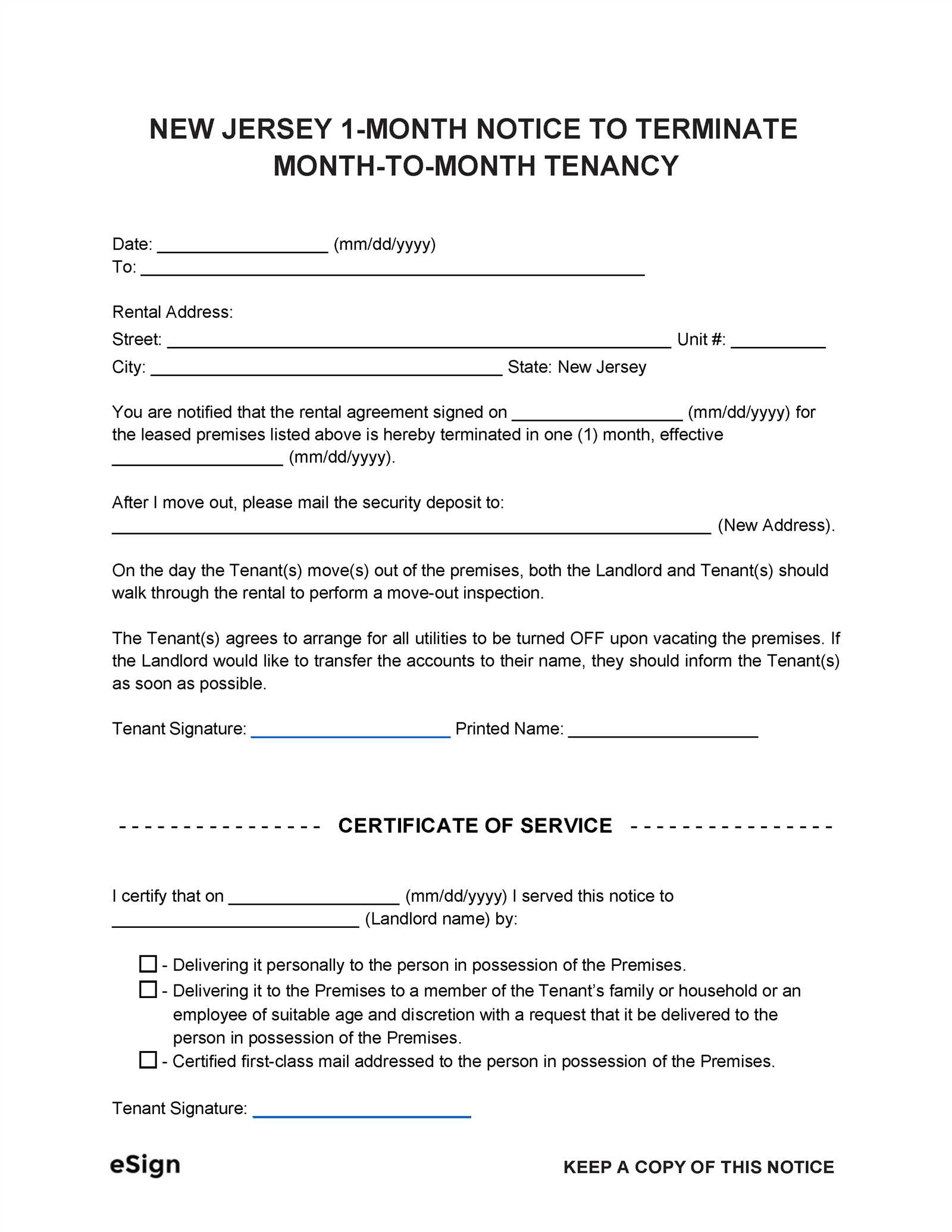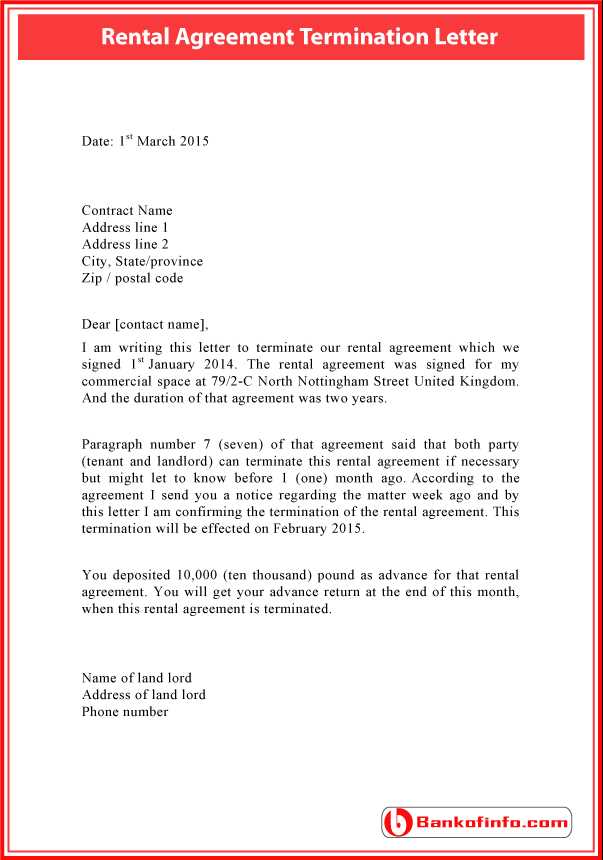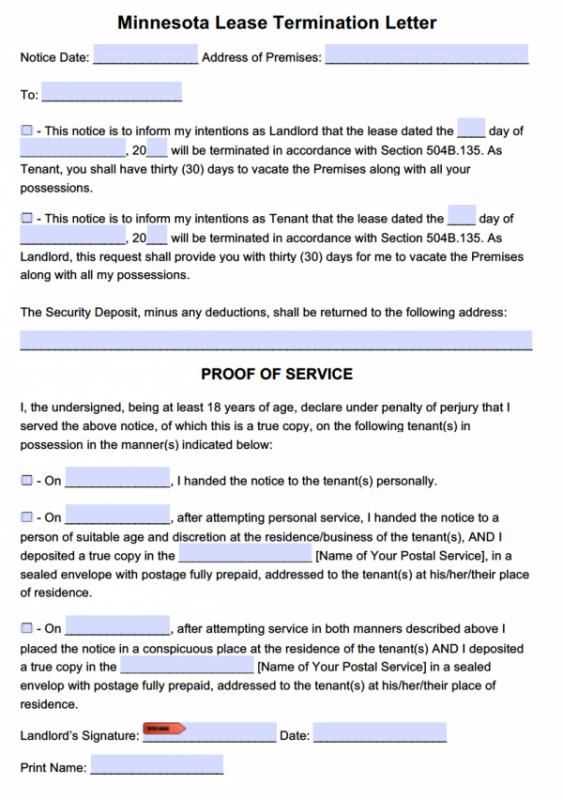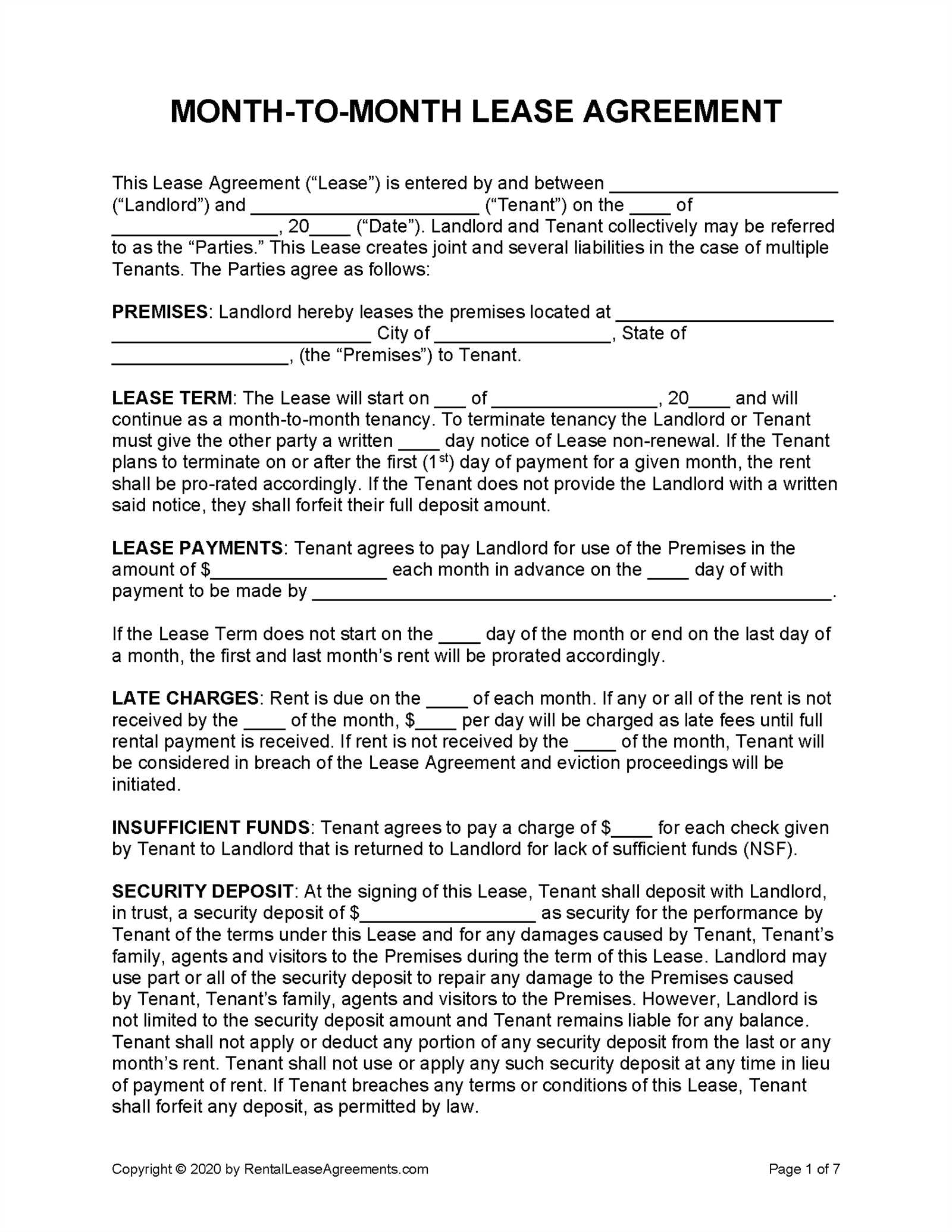Landlord month to month lease termination letter template

When ending a month-to-month lease, a clear and concise letter is crucial. It helps prevent misunderstandings and ensures that both parties follow the proper legal steps. Below is a template for a landlord to use when terminating a month-to-month lease.
Key Information: Begin by specifying the date of the letter and include details about the tenant’s lease agreement. Mention the required notice period, which is typically 30 days, but check local laws for specific requirements. This ensures that the tenant is given enough time to make necessary arrangements.
Contents of the Letter: The letter should include the date of termination and the reason for ending the lease, although landlords are not obligated to provide a reason. Be sure to request that the tenant vacates the property by the specified date and remind them of any obligations, like returning keys or cleaning the property.
Final Steps: Once the letter is prepared, send it through a trackable method to ensure the tenant receives it. Keep a copy for your records. Sending the letter on time is critical to avoid disputes and maintain a professional relationship with the tenant.
Here’s the revised text with repetitions removed:
To create a clear and professional month-to-month lease termination letter, be sure to include the following key components:
| Component | Details |
|---|---|
| Tenant’s Information | Start with the tenant’s full name, rental address, and the date of the letter. |
| Termination Notice | Specify the termination date, ensuring it meets any required notice period as stated in the lease agreement. |
| Reason for Termination | If applicable, briefly state the reason for ending the lease. This is optional unless required by local laws. |
| Next Steps | Include instructions for moving out, returning keys, and any other necessary actions for the tenant to complete. |
| Signature | Sign the letter and provide your contact information for any follow-up communication. |
Ensure the tone remains professional and respectful throughout the letter to maintain a positive relationship with the tenant.
- Landlord Month-to-Month Lease Termination Letter Template
To terminate a month-to-month lease, the landlord should provide a written notice that clearly communicates the intent to end the lease agreement. The letter should include key details: the tenant’s name, the property address, the date the termination notice is issued, and the effective date of termination. It is also important to mention any legal requirements such as the notice period, typically 30 days, unless otherwise specified in the lease agreement.
Here is a basic template for a landlord month-to-month lease termination letter:
Landlord Month-to-Month Lease Termination Letter
[Date]
[Tenant’s Name]
[Tenant’s Address]
Dear [Tenant’s Name],
This letter serves as a formal notice of termination for your month-to-month lease agreement for the property located at [Property Address]. According to the terms of the lease, I am providing [Number of Days] days’ notice, making the termination effective on [Effective Date].
Please ensure that all personal belongings are removed from the property by this date, and the property is returned in the same condition as when you moved in. Any remaining balance of rent or other charges should be settled before your departure.
If you have any questions regarding this process, please feel free to contact me at [Phone Number] or [Email Address].
Sincerely,
[Landlord’s Name]
[Landlord’s Address]
Ensure that the letter is delivered with enough time for the tenant to vacate the property by the termination date. You may choose to send it by certified mail to confirm receipt.
Make sure your notice clearly states the date of termination. Specify the exact day the lease will end, allowing for the required notice period as outlined in the lease agreement, typically 30 days.
Include the tenant’s name and address. This ensures there is no confusion about the lease being terminated for the correct individual and property.
Indicate the reason for termination if required. Some jurisdictions may require a valid reason, while others may not. If your state mandates it, provide a concise, factual explanation. Keep it professional.
Reference the lease agreement clearly. Cite the section of the contract that governs termination, ensuring the recipient understands the legal basis of the notice.
Include a signature and your contact details. A signed notice is crucial to make it legally valid, and offering your contact information ensures the tenant can reach you with any questions.
Lastly, always send the notice via a method that provides proof of receipt, such as certified mail, so you have evidence the tenant was notified appropriately.
State the exact date the lease will end. Be precise and use a specific calendar day to avoid confusion. For example, “The lease will terminate on March 31, 2025.” Avoid vague terms like “end of the month” or “a few weeks after notice.” This helps both parties clearly understand the termination date.
Use Clear Language

Write in simple, direct language. Specify both the start and end dates of the lease period. For example: “The lease will start on January 1, 2025, and end on March 31, 2025.” This avoids any misunderstanding about the lease duration.
Consider the Notice Period
Ensure the tenant has adequate notice as required by law, typically 30 days, unless a different notice period is agreed upon. Mention the notice date clearly to confirm the agreement. For example: “The tenant must provide notice of termination 30 days before March 31, 2025.” This ensures both parties are aligned on expectations.
Include the notice period required by local laws. Typically, a landlord must provide at least 30 days’ notice, but this can vary depending on your jurisdiction. Confirm the specific timeframe for your area before finalizing the letter.
Identify the Correct Parties Involved
Ensure the notice is addressed correctly to the tenant. Include their full name, the address of the rental property, and the date the notice is being issued. This ensures clarity and avoids any confusion later on.
Specify the Termination Date

Clearly state the date the lease will end. This helps both parties understand the final day of occupancy, making it easier for the tenant to plan their move-out. Be sure to align this date with the legal notice period required.
To ensure proper communication and avoid any misunderstandings, delivering the termination notice in a clear and professional manner is critical. The methods listed below provide effective ways to deliver this notice to your tenant.
1. Hand Delivery
Handing the notice directly to your tenant ensures immediate receipt. This method allows for personal confirmation, which minimizes the chances of miscommunication. It’s a good practice to request a signature upon delivery, creating a record of receipt. Always keep a copy of the signed notice for your records.
2. Certified Mail

Certified mail offers a secure and traceable option. It provides proof of delivery through tracking and requires the tenant’s signature upon receipt. This method is ideal if the tenant is not easily accessible for hand delivery.
| Method | Pros | Cons |
|---|---|---|
| Hand Delivery | Immediate confirmation, personal interaction | Requires tenant’s availability |
| Certified Mail | Trackable, proof of receipt | Not immediate, may take longer to arrive |
Both hand delivery and certified mail ensure that the termination notice is received properly. Choose the method based on the tenant’s availability and your preferred level of documentation.
Clearly state the amount of the security deposit that will be refunded and the date by which the tenant can expect to receive it. If any deductions will be made, provide a detailed breakdown of each cost, such as for cleaning, repairs, or unpaid rent. Mention the applicable laws or lease agreement terms that govern the refund process.
Timing of Refund
Specify the time frame for returning the security deposit. Depending on local laws, this may vary, but generally, landlords are required to refund it within a certain number of days after the tenant has vacated the property.
Itemized Deductions
If any deductions are made, include an itemized list of the charges, such as repairs or cleaning costs. This transparency helps avoid disputes and ensures the tenant understands the reasoning behind the reduced amount.
Ensure to include a reminder that the tenant can request an explanation or receipt for any deducted costs if they feel they were unfairly charged. This reinforces clear communication and fairness in the refund process.
If the tenant disagrees with the termination of the month-to-month lease, it’s important to review the lease terms and local laws. Start by communicating clearly and professionally, explaining the reasons for the termination in writing. Keep a record of all correspondence with the tenant for future reference.
1. Discuss the Issue with the Tenant

Schedule a meeting or call to discuss the situation. Address their concerns and be open to negotiating terms, such as extending the notice period or offering alternative solutions like a buyout. This can help reach a mutual understanding without escalating the situation further.
2. Provide Written Notice of Termination
Ensure that you provide the tenant with a formal, written notice according to the required notice period stipulated in the lease agreement and local laws. This document should detail the reason for the termination, the date the termination is effective, and any next steps required from the tenant.
If the tenant still refuses to vacate, you may need to take legal action to enforce the termination. Consult with a lawyer to understand the best course of action based on the situation and local regulations.
Termination of Month-to-Month Lease
To effectively terminate a month-to-month lease, follow these steps:
- Provide written notice to the tenant at least 30 days before the desired termination date.
- Ensure the letter includes clear details such as the tenant’s name, property address, and date of notice.
- State the specific date the lease will end, and clarify that the tenant must vacate the property by this date.
- Make sure the letter is signed by the landlord to confirm its authenticity.
- Send the notice via certified mail or deliver it in person for proof of receipt.
Always keep a copy of the letter for your records and follow up to ensure the tenant acknowledges it.